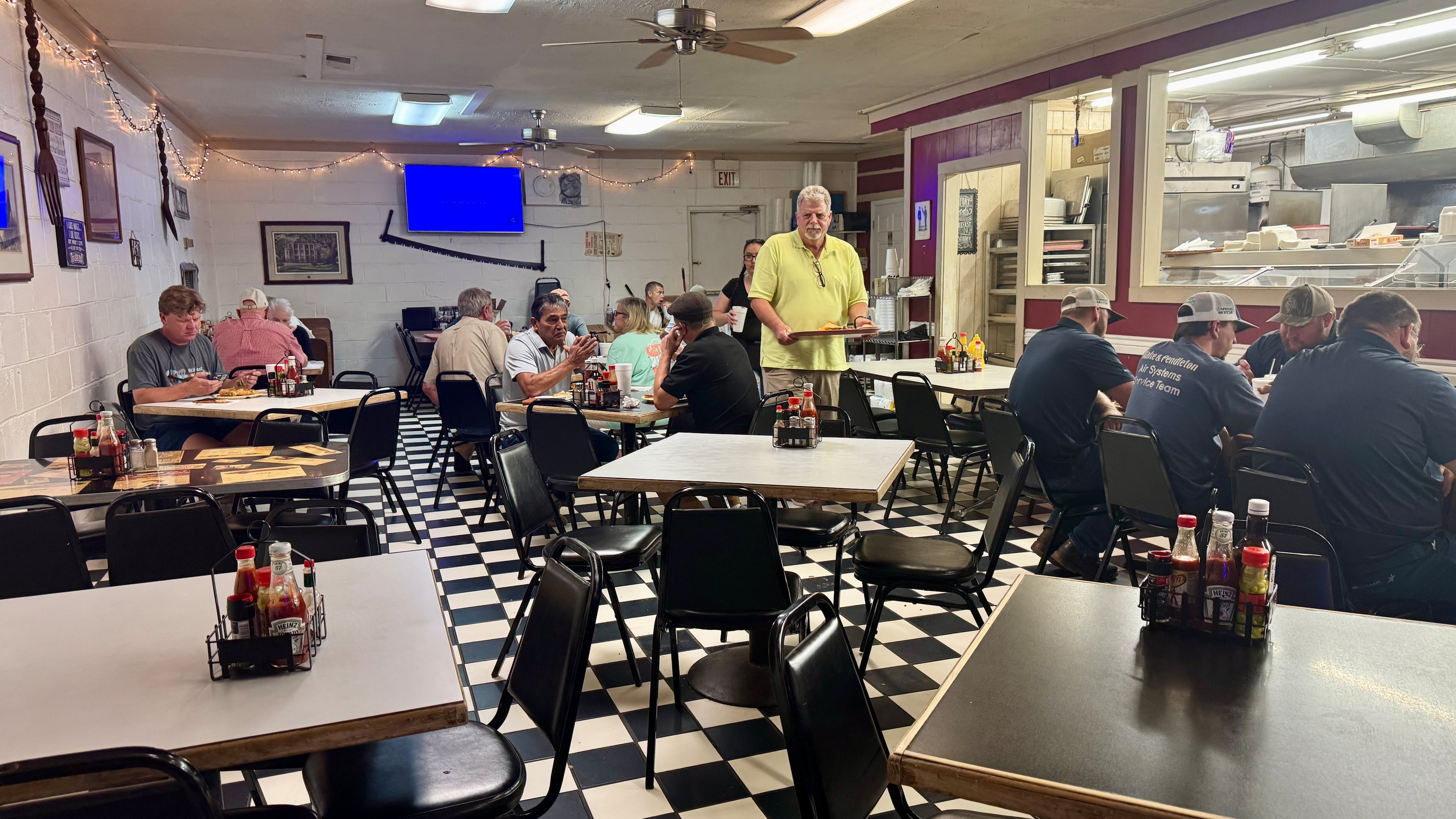Dispatch: Georgia’s most blue-collar diner? Psst, it’s near a landfill.

Editor’s note: “Dispatches” are occasional snapshots of people, places, scenes or moments from around Georgia that our reporters come across. They aim to be immersive and aren’t always tied to a news event.
MACON — A red-lettered sign near the front door of Cox Cafe warns, “Compact Cars Only.” But there is no such parking. The space is blocked by a stone planter.
Besides, there are few such autos in this part of town. In the lunch hour, other spots ringing the restaurant and along roads surrounding it are stuffed with pickups, dump trucks, crew haulers.
The concrete-block edifice has walls painted white as hungry teeth. The facade screams, “Work boots required.” The thick metal door, red as a kidney bean, looks like it just might open to the sound of a secret knock.
The restaurant exudes the charm of a country jailhouse. It also could pass for a roadside pub, a juke joint, a backroads service station that almost assuredly does not stock the part your broken-down car requires.
It is the kind of place where half a dozen guys crouched over their plates will inform you that they work for an outfit that, to quote them precisely, specializes in rotary screw air compressors.
The food, as regulars might put it, is solid. Fried chicken. Pork chops. Meat loaf. Green beans. Mashed potatoes. Rutabagas.

Local writers over the years, often also remarking on its spartan decor, have reviewed its fare perhaps more frequently than any area eatery. Their incorrect assumptions being the place is so hidden that they are surely among the first to discover it. Fifteen years ago, the Macon Telegraph dubbed it “a working man’s restaurant in a working man’s neighborhood” and noted it is “not the kind of place one just happens upon.”
The café is gritty as they come, square in the not-so-clogged heart of an industrial district, away from the airs of downtown’s more ordinary establishments. Here you are dining next door to a barn of a structure that houses an exterminating business (Pest Express). A mile and a half from the county landfill. And on the same road and about half that far from the sewage-treatment plant.
Some iterations of the café’s signage have included an accent over the “e” in café. Others do not. The restaurant has no website.
The café was built in 1947 in the oft-unseen avenues of this city’s eastern reaches. Out where the Ocmulgee River swings hard to the south. Within easy earshot of a teeming rail yard and a scrap yard and a ball yard, four home runs or so from home plate at historic Luther Williams Field.
Burglar bars adorn its nigh-windowless front. Remnants perhaps of tough times in the 1950s when it was known as the Bull Frog Cafe. When burglars on occasion swiped cigarettes and candy bars. Or, say, the heist in ’58 when proprietor Eloise Helton told the cops how two bandits ordered cold drinks and, when she turned to pour them, swiped $800 cash and, yes, $4,000 in checks from her money box.
Not long ago, a train derailed and, for hours, blocked the only road in or out of the café.
But the café fits here, squat and steady, a fortress as indestructible as a burnt biscuit.
Next year will mark its 30th year as the Cox Cafe. Owner David Cox took over after the previous operators, who dubbed it the Cowfé, went out of business. Friends asked Cox, who hails from a family of restaurateurs, why on earth he chose such a seemingly undesirable spot. Simple, he said: He ate there a lot.
The other day, one of his regulars, an 80-year-old man named Aubrey Parten, recalled dining at the Bull Frog Cafe. He was in his teens. Meals were 35 cents. Back then, Parten, who runs an auto auction on the city’s south side, drove a forklift for Burns Brick Co.
Never mind that the menu may not feature the healthiest grub. On this day, Parten’s meat-and-three plate included a side of green peppers. Hot ones. “Good for you,” he observed between bites. “Kill cancer.”




